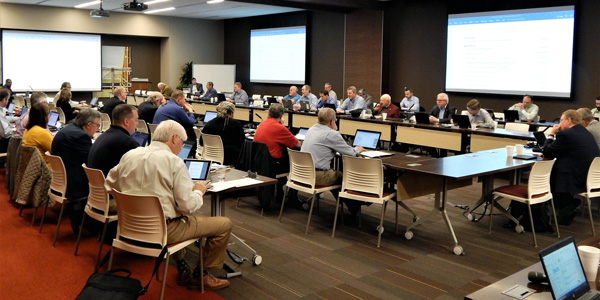By Tom Kleckner
LITTLE ROCK, Ark. — SPP said Thursday it will join the ISO/RTO Council’s (IRC) filing against the Department of Energy’s Notice of Proposed Rulemaking to support struggling coal and nuclear plants, pointing to what staff called “some pretty strong comments.”
“The council does a really good job of laying out why this doesn’t work from an RTO perspective,” SPP General Counsel Paul Suskie told the Strategic Planning Committee.
Initial comments on the NOPR (RM18-1) are due at FERC by Monday as part of a compressed 90-day timeline that has drawn industry-wide criticism. DOE’s proposal requires that generators with 90 days of on-site fuel supply receive “full recovery” of their costs. (See Perry Orders FERC Rescue of Nukes, Coal.)
Suskie told the committee the IRC’s comments contend the timeline is not practical, that FERC is already addressing many of the issues with its price-formation directives and that the DOE proposal will only make the electric markets worse.
“If you’re a plant under the rule, your costs are totally covered,” Suskie said. “Why would you do anything but bid zero into the market? It will drive costs down further and distort markets further.”
Some stakeholders expressed discomfort with signing onto the IRC comments without seeing the language.
“The basic issue here is the subsidy,” countered SPP Board Chair Jim Eckelberger, saying renewable energy tax credits had led to oversupply. “We don’t want to screw up the market even more. We should take a strong stand here.”
Staff will also file comments raising issues and seeking clarifications on the NOPR’s language. Separately, SPP’s Market Monitoring Unit will file its own comments.
In its call for comments, FERC said the NOPR’s scope applies to commission-approved ISOs and RTOs with capacity markets and day-ahead and real-time energy markets. Noting SPP’s lack of a capacity market, Suskie said while it “appears this rule is not applicable to SPP,” staff will work under the assumption that a final FERC rule could apply to the RTO.
Suskie said staff will develop further comments for the reply comments, due Nov. 7. The comments will note SPP operates in states with vertically integrated utilities, where capacity is provided by regulatory constructs, and that the 90-day timeline is “impractical.”
“Staff would recommend additional time to implement if the final rule applies to SPP,” Suskie said, noting staff would have to compile a list of eligible facilities. “Staff is very concerned. … If you read what the intent appears to be, basically any coal or nuclear plant not [rate-based] within an RTO would have to be fully compensated.”
Suskie asked who would determine a plant’s rate of return and cost of capital.
“Traditionally, those things are decided at the commissions, not RTOs,” he said. “How do you enforce a 90-day coal supply? How do you enforce whether a plant complies with environmental regulations?
“If this is applicable to SPP, it would be a big sea change,” Suskie said.
Keith Collins, executive director of SPP’s MMU, said his group agrees with much of what Suskie said, saying the NOPR is “proposing a solution to a problem that’s not well defined.”
The NOPR “doesn’t define the problem well in a way that’s actionable and measurable,” Collins said. “When you actually read the [recent DOE grid study], it says more work needs to be done to value and define resiliency before you come up with solutions. What’s included, what’s excluded … it’s hard to say.”
Like Suskie, Collins said the 90-day timeline does not allow sufficient time to properly consider the NOPR.
“If there’s a question to be raised, it can be answered over time, but we don’t support what’s going on,” he said. “Competitive forces have been part of policy in the energy and electricity markets over the last 25 years. It will provide new technologies, batteries and the like, that will improve the resiliency for the grid in ways we’re not aware of today.
“What the Energy Policy Act of 1992 did was promote competitive markets and open access,” Collins said. “If someone can provide power cheaper than someone else, they should be able to do that. If I built a plant a while ago that’s unprofitable, that’s a signal. Resources are indicating they are not being able to recover their costs. We see the consequences of a policy like this with our negative pricing.”








